wp3
CLA 2022
24/06/22/12:34 Filed in: Conference participation
Concept Lattices and their Applications, CLA, Tallinn, Estonia, June 20-22, 2022
We presented four works "Fuzzy closure systems over Heyting algebras as fixed points of a fuzzy Galois connection" (by Emilio Muñoz and other colleagues in the department, Manuel Ojeda-Hernández presented the paper), "Revisiting Algorithms for Fuzzy Concept Lattices" (by Domingo López and other colleagues in the department), and "Partial formal contexts with degrees" and "On the affordance-theoretic bases of the landscape of knowledge paradigm" (by Manuel Ojeda-Aciego and others).
Back to the onsite format conference, with interesting invited talks by our colleagues and co-authors Peter Vojtáš and Bernard De Baets.
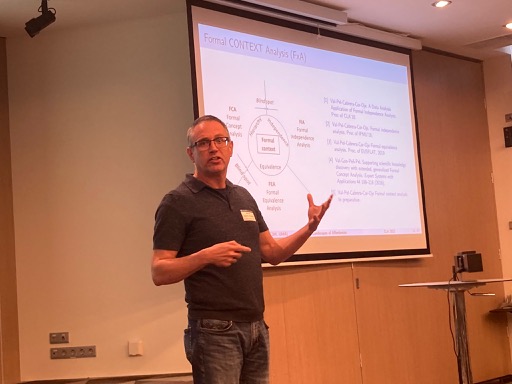
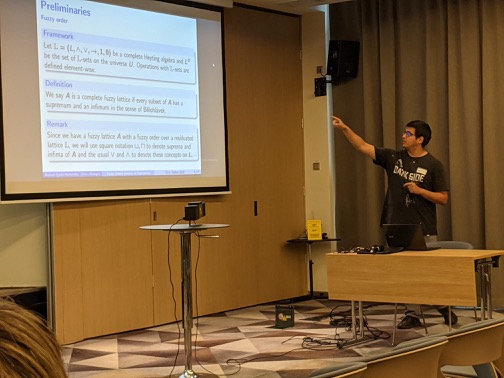
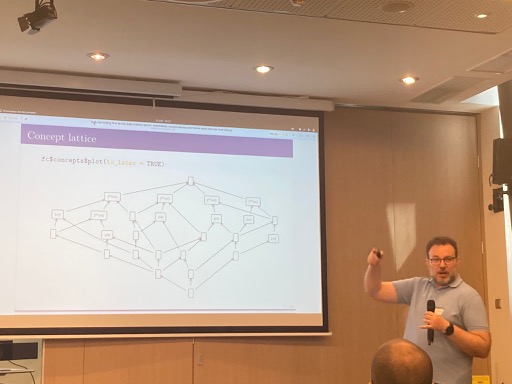
Conference papers accepted
01/07/22/10:17 Filed in: Conference papers
N. Madrid, M. Ojeda-Aciego. Nuevos resultados sobre el f-índice de inclusión. Simp. Nacional sobre Tecnología y Lógica Difusa (ESTYLF), Toledo, 2022.
ABSTRACT En este documento presentamos alguno de los últimos resultados teóricos obtenidos sobre el f-índice de inclusión. Estos resultados motivan el uso de dicho índice como una nueva forma de representar la inclusión entre dos conjuntos difusos y como un operador de inferencia lógica. En este resumen recordamos dos: se satisfacen los axiomas de Sinha-Dougherty (convenientemente adaptados al marco teórico del f-índice de inclusión) y, además, corresponde a una elección optimal de una implicación difusa residuada para llevar a cabo la inferencia Modus Ponens.
I.P. Cabrera, P. Cordero, E. Muñoz-Velasco, Manuel Ojeda-Aciego. Conexiones de Galois relacionales difusas entre digrafos transitivos difusos. Simp. Nacional sobre Tecnología y Lógica Difusa (ESTYLF), Toledo, 2022.
ABSTRACT Presentamos una versión difusa de la noción de conexión de Galois relacional entre grafos dirigidos transitivos difusos (digrafos T-difusos) en el entorno específico en el que el álgebra subyacente de valores de verdad es un álgebra de Heyting completa. Los componentes de dicha conexión de Galois difusa son relaciones difusas que satisfacen ciertas propiedades razonables expresadas en términos de lo que denominamos "full powering". Además, proporcionamos una condición necesaria y suficiente bajo la cual es posible construir un adjunto a la derecha para una relación difusa dada entre un digrafo T-difuso y un conjunto no estructurado.
F. Pérez-Gámez, P. Cordero, M. Enciso, Á. Mora, M. Ojeda-Aciego. Análisis de conceptos formales bajo una visión intuicionista. Simp. Nacional sobre Tecnología y Lógica Difusa (ESTYLF), Toledo, 2022.
ABSTRACT Contextos formales parciales son contextos con tres valores que nos permite establecer cuando una propiedad se satisface o no. Además, permite representar situaciones en las que existe ignorancia sobre si una propiedad se satisface o no. Esto puede ser bastante útil en diferentes aspectos como cuando hay información desconocida o, también, cuando aparece la información desconocida debido a intentamos reducir el tamaño de un contexto formal agrupando filas. En este artículo extendemos estas nociones e ideas para añadir grados de conocimiento.
M. Ojeda-Hernandez, I. P. Cabrera, P. Cordero, E. Muñoz-Velasco. Un estudio preliminar de relaciones de clausura difusas. Simp. Nacional sobre Tecnología y Lógica Difusa (ESTYLF), Toledo, 2022.
ABSTRACT Los operadores de clausura son elementos clave de las matemáticas tanto puras como aplicadas. Esta contribución trata la búsqueda de una definición de relación de clausura difusa que extienda de manera apropiada el concepto de operador de clausura en el marco de los retículos completos difusos. La condición que se busca extender es la correspondencia biyectiva con los sistemas de clausura difusos. Se parte de las definiciones existentes de relación de clausura difusa y se acotan las condiciones necesarias para la existencia de la biyección hasta que se encuentran las condiciones óptimas.
P. Cordero, M. Enciso, D. López-Rodríguez, Á. Mora. Uso de Lógica Difusa para Construir un Sistema Recomendador Médico. Simp. Nacional sobre Tecnología y Lógica Difusa (ESTYLF), Toledo, 2022.
ABSTRACT En este trabajo, se propone un motor automatizado basado en la Lógica de Simplificación difusa para realizar sugerencias a los usuarios.
Los sistemas de recomendación conversacional han demostrado ser un buen enfoque en telemedicina, construyendo un diálogo entre el usuario y el recomendador basado en las preferencias del usuario proporcionadas en cada paso de la conversación. Aquí proponemos un sistema de recomendación conversacional para el diagnóstico médico utilizando la lógica difusa.
ABSTRACT En este documento presentamos alguno de los últimos resultados teóricos obtenidos sobre el f-índice de inclusión. Estos resultados motivan el uso de dicho índice como una nueva forma de representar la inclusión entre dos conjuntos difusos y como un operador de inferencia lógica. En este resumen recordamos dos: se satisfacen los axiomas de Sinha-Dougherty (convenientemente adaptados al marco teórico del f-índice de inclusión) y, además, corresponde a una elección optimal de una implicación difusa residuada para llevar a cabo la inferencia Modus Ponens.
I.P. Cabrera, P. Cordero, E. Muñoz-Velasco, Manuel Ojeda-Aciego. Conexiones de Galois relacionales difusas entre digrafos transitivos difusos. Simp. Nacional sobre Tecnología y Lógica Difusa (ESTYLF), Toledo, 2022.
ABSTRACT Presentamos una versión difusa de la noción de conexión de Galois relacional entre grafos dirigidos transitivos difusos (digrafos T-difusos) en el entorno específico en el que el álgebra subyacente de valores de verdad es un álgebra de Heyting completa. Los componentes de dicha conexión de Galois difusa son relaciones difusas que satisfacen ciertas propiedades razonables expresadas en términos de lo que denominamos "full powering". Además, proporcionamos una condición necesaria y suficiente bajo la cual es posible construir un adjunto a la derecha para una relación difusa dada entre un digrafo T-difuso y un conjunto no estructurado.
F. Pérez-Gámez, P. Cordero, M. Enciso, Á. Mora, M. Ojeda-Aciego. Análisis de conceptos formales bajo una visión intuicionista. Simp. Nacional sobre Tecnología y Lógica Difusa (ESTYLF), Toledo, 2022.
ABSTRACT Contextos formales parciales son contextos con tres valores que nos permite establecer cuando una propiedad se satisface o no. Además, permite representar situaciones en las que existe ignorancia sobre si una propiedad se satisface o no. Esto puede ser bastante útil en diferentes aspectos como cuando hay información desconocida o, también, cuando aparece la información desconocida debido a intentamos reducir el tamaño de un contexto formal agrupando filas. En este artículo extendemos estas nociones e ideas para añadir grados de conocimiento.
M. Ojeda-Hernandez, I. P. Cabrera, P. Cordero, E. Muñoz-Velasco. Un estudio preliminar de relaciones de clausura difusas. Simp. Nacional sobre Tecnología y Lógica Difusa (ESTYLF), Toledo, 2022.
ABSTRACT Los operadores de clausura son elementos clave de las matemáticas tanto puras como aplicadas. Esta contribución trata la búsqueda de una definición de relación de clausura difusa que extienda de manera apropiada el concepto de operador de clausura en el marco de los retículos completos difusos. La condición que se busca extender es la correspondencia biyectiva con los sistemas de clausura difusos. Se parte de las definiciones existentes de relación de clausura difusa y se acotan las condiciones necesarias para la existencia de la biyección hasta que se encuentran las condiciones óptimas.
P. Cordero, M. Enciso, D. López-Rodríguez, Á. Mora. Uso de Lógica Difusa para Construir un Sistema Recomendador Médico. Simp. Nacional sobre Tecnología y Lógica Difusa (ESTYLF), Toledo, 2022.
ABSTRACT En este trabajo, se propone un motor automatizado basado en la Lógica de Simplificación difusa para realizar sugerencias a los usuarios.
Los sistemas de recomendación conversacional han demostrado ser un buen enfoque en telemedicina, construyendo un diálogo entre el usuario y el recomendador basado en las preferencias del usuario proporcionadas en cada paso de la conversación. Aquí proponemos un sistema de recomendación conversacional para el diagnóstico médico utilizando la lógica difusa.
ESTYLF conference organized
The FLAIR group organises ESTYLF (the Spanish Conference on Fuzzy Logic and Technology) as an event of CAEPIA (Spanish conference on Artificial Intelligence), within the Spanish Conference of Informatics (CEDI) in Málaga
The new edition of the Spanish Conference on Fuzzy Logic and Technology (ESTYLF) has been organised by our group, being Manuel Ojeda-Aciego the Scientific Chair (together with Susana Montes from Univ. Oviedo).
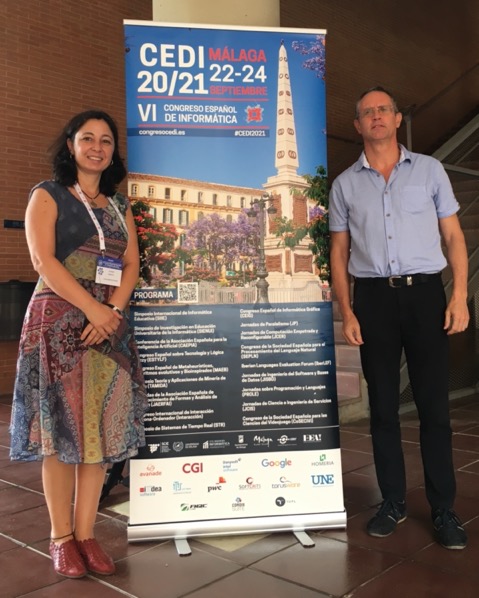
We also participate as co-editors of the proceedings of CAEPIA'21, published by Springer.
Conference paper accepted
18/06/21/13:30 Filed in: Conference paper
N. Madrid, M. Ojeda-Aciego. Measuring Consistency of Fuzzy Logic Theories. Proc. of the Spanish Conference on Fuzzy Logic and Technology, Málaga, 2021.
ABSTRACT Fuzzy logic has shown to be a suitable framework to handle contradictions in which, unsurprisingly, the notion of inconsistency can be defined in different ways. This paper starts with a short survey of different ways to define the notion of inconsistency in fuzzy logic systems. As a result, we provide a first notion of inconsistency by means of the absence of models. Subsequently, we define two measures of consistency that belong purely to the fuzzy paradigm; in the sense that both measures coincide with the crisp notion of consistency when the set of truth values is $\{0,1\}$. Accordingly, we can state that the two provided measures of consistence are notions of consistence based on degrees, bringing back the spirit of fuzzy logic into the notion of consistency.
ABSTRACT Fuzzy logic has shown to be a suitable framework to handle contradictions in which, unsurprisingly, the notion of inconsistency can be defined in different ways. This paper starts with a short survey of different ways to define the notion of inconsistency in fuzzy logic systems. As a result, we provide a first notion of inconsistency by means of the absence of models. Subsequently, we define two measures of consistency that belong purely to the fuzzy paradigm; in the sense that both measures coincide with the crisp notion of consistency when the set of truth values is $\{0,1\}$. Accordingly, we can state that the two provided measures of consistence are notions of consistence based on degrees, bringing back the spirit of fuzzy logic into the notion of consistency.
Conference paper accepted
15/03/21/09:11 Filed in: Conference paper
D. López-Rodríguez, P. Cordero, M. Enciso, Á. Mora. Clustering and identification of core implications. Int Con on Formal Concept Analysis (ICFCA), Strasbourg, 2021.
ABSTRACT FCA exhaustively uses the notion of cluster, by grouping attributes and objects and also providing a strong algebraic structure to them by means of the concept lattice. Our proposal explores how we can cluster implications. This work opens a research line in the direction of studying the knowledge inside the clusters computed from the Duquenne-Guigues basis. Some alternative measures to induce the clusters are analyzed, taking into account the information that directly appears in the appearance and in the semantics of the implications. This work also allows us to show to the FCA community the fcaR package, having the main methods of FCA and of the Simplification Logic. The paper ends with a motivation of the potential applications of performing clustering on the implications.
ABSTRACT FCA exhaustively uses the notion of cluster, by grouping attributes and objects and also providing a strong algebraic structure to them by means of the concept lattice. Our proposal explores how we can cluster implications. This work opens a research line in the direction of studying the knowledge inside the clusters computed from the Duquenne-Guigues basis. Some alternative measures to induce the clusters are analyzed, taking into account the information that directly appears in the appearance and in the semantics of the implications. This work also allows us to show to the FCA community the fcaR package, having the main methods of FCA and of the Simplification Logic. The paper ends with a motivation of the potential applications of performing clustering on the implications.
Journal paper accepted
24/03/21/08:55 Filed in: Journal paper
N. Madrid, C. López-Molina and P. Hurtik. Non-linear scale-space based on fuzzy contrast enhancement: Theoretical results. Fuzzy Sets and Systems 421:133-157, 2021.
ABSTRACT This work presents a contrast enhancement operator based on a fuzzy-numerical description of images at the pixel level; this operator is further used to construct a scale-space, whose theoretical and practical properties are reviewed. A very remarkable feature of our scale-space is that, in contrast to many other scale-spaces, it converges to non-trivial stages. Within the study of our scale-space, we present a series of theoretical results that show that the convergence of the scale-space is closely related to the signal's convexity. Specifically, we prove formally that the intensities in convex signals tend to converge to the minimum intensity. As a result, our scale-space increases the contrast in the image and homogenizes images. In addition to theoretical results, we illustrate the scale-space's behaviour in ad-hoc 1D signals and in greyscale images. Finally, to validate the potential application of this theoretical approach, we show that the proposal can be used as a preprocessing that performed before a neural network technique, increasing the accuracy in a classification task.
ABSTRACT This work presents a contrast enhancement operator based on a fuzzy-numerical description of images at the pixel level; this operator is further used to construct a scale-space, whose theoretical and practical properties are reviewed. A very remarkable feature of our scale-space is that, in contrast to many other scale-spaces, it converges to non-trivial stages. Within the study of our scale-space, we present a series of theoretical results that show that the convergence of the scale-space is closely related to the signal's convexity. Specifically, we prove formally that the intensities in convex signals tend to converge to the minimum intensity. As a result, our scale-space increases the contrast in the image and homogenizes images. In addition to theoretical results, we illustrate the scale-space's behaviour in ad-hoc 1D signals and in greyscale images. Finally, to validate the potential application of this theoretical approach, we show that the proposal can be used as a preprocessing that performed before a neural network technique, increasing the accuracy in a classification task.
Journal paper accepted
15/03/21/09:42 Filed in: Journal paper
N. Madrid and M. Ojeda-Aciego. A Measure of Consistency for Fuzzy Logic Theories. Mathematical Methods in the Applied Sciences, 2021. To appear
ABSTRACT Fuzzy logic has shown to be a suitable framework to handle contradictions in which, unsurprisingly, the notion of inconsistency can be defined in different ways. This paper starts with a short survey of different ways to define the notion of inconsistency in fuzzy logic systems. As a result, we provide a first notion of inconsistency by means of the absence of models. Subsequently, we define two measures of consistency that belong purely to the fuzzy paradigm; in the sense that both measures coincide with the crisp notion of consistency when the set of truth values is {0,1}. Accordingly, we can state that the two provided measures of consistence are notions of consistence based on degrees, bringing back the spirit of fuzzy logic into the notion of consistency.
ABSTRACT Fuzzy logic has shown to be a suitable framework to handle contradictions in which, unsurprisingly, the notion of inconsistency can be defined in different ways. This paper starts with a short survey of different ways to define the notion of inconsistency in fuzzy logic systems. As a result, we provide a first notion of inconsistency by means of the absence of models. Subsequently, we define two measures of consistency that belong purely to the fuzzy paradigm; in the sense that both measures coincide with the crisp notion of consistency when the set of truth values is {0,1}. Accordingly, we can state that the two provided measures of consistence are notions of consistence based on degrees, bringing back the spirit of fuzzy logic into the notion of consistency.
Book chapter accepted
01/07/22/09:17 Filed in: Book chapter
D. López-Rodríguez, E. Muñoz-Velasco, M. Ojeda-Aciego. Formal methods in FCA and Big Data. In Complex Data Analytics with Formal Concept Analysis, (R. Missaoui, L. Kwuida, T. Abdessalem, ed.) Springer. 2022.
ABSTRACT Formal Concept Analysis (FCA) plays an important role in knowledge representation and knowledge discovery, and has generated an increasingly growing research field. The use of FCA in the context of big data provides a basis for better interpretability and explainability of results, usually lacking in other statistical approaches to data analysis; however, scalability is an important issue for FCA logic-based tools and techniques, such as the generation and use of implicational systems. We survey the theoretical and technical foundations of some trends in FCA. Specifically, we present a summary of promising theoretical and practical applications of FCA that could be used to solve the problem of dealing with big data. Furthermore, we propose some directions for future research to solve this problem.
ABSTRACT Formal Concept Analysis (FCA) plays an important role in knowledge representation and knowledge discovery, and has generated an increasingly growing research field. The use of FCA in the context of big data provides a basis for better interpretability and explainability of results, usually lacking in other statistical approaches to data analysis; however, scalability is an important issue for FCA logic-based tools and techniques, such as the generation and use of implicational systems. We survey the theoretical and technical foundations of some trends in FCA. Specifically, we present a summary of promising theoretical and practical applications of FCA that could be used to solve the problem of dealing with big data. Furthermore, we propose some directions for future research to solve this problem.
CMMSE'20
02/08/20/10:14 Filed in: Conference participation | Chairing
Int Conf on Computational and Mathematical Methods in Science and Engineering, CMMSE, Rota, Cádiz, Spain, July 26-30 2020
Although the original dates were changed due to the COVID-19 outbreak, the conference was finally held at the end of july in Rota (Cádiz), Spain.
As in previous years, we included in CMMSE a special session entitled Mathematical Methods in Computer Science, in cooperation with the Royal Spanish Society of Mathematics. Obviously, the onsite attendance was not as massive as in last edition, however the session was well-attended both by the speakers (all present at the conference) and the online participants. We presented the work "Inconsistency in fuzzy logic systems".
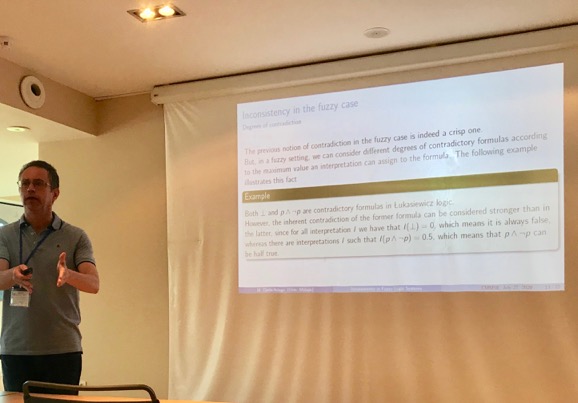
Journal paper accepted
09/09/20/18:39 Filed in: Journal paper
P. Cordero, M. Enciso, A. Mora, M. Ojeda-Aciego, C. Rossi. A Formal Concept Analysis approach to cooperative conversational recommendation. International Journal of Computational Intelligence Systems, 13(1):1243-1252, 2020.
ABSTRACT We focus on the development of a method to guide the choice of a set of users in an environment where the number of features describing the items is high and user interaction becomes laborious. Using the framework of formal concept analysis, particularly the notion of implication between attributes, we propose a method strongly based on logic which allows to manage the users' preferences by following a conversational paradigm. Concerning complexity, to build the conversation and provide updated information based on the users' previous actions (choices) the method has polynomial delay.
ABSTRACT We focus on the development of a method to guide the choice of a set of users in an environment where the number of features describing the items is high and user interaction becomes laborious. Using the framework of formal concept analysis, particularly the notion of implication between attributes, we propose a method strongly based on logic which allows to manage the users' preferences by following a conversational paradigm. Concerning complexity, to build the conversation and provide updated information based on the users' previous actions (choices) the method has polynomial delay.
Journal paper accepted
20/04/20/10:04 Filed in: Journal paper
P. Cordero, M. Enciso, D. López, A. Mora. A conversational recommender system for diagnosis using fuzzy rules. Expert Systems with Applications, 154:113449, 2020.
ABSTRACT Graded implications in the framework of Fuzzy Formal Concept Analysis are used as the knowledge guiding the recommendations. An automated engine based on fuzzy Simplification Logic is proposed to make the suggestions to the users. Conversational recommender systems have proven to be a good approach in telemedicine, building a dialogue between the user and the recommender based on user preferences provided at each step of the conversation. Here, we propose a conversational recommender system for medical diagnosis using fuzzy logic. Specifically, fuzzy implications in the framework of Formal Concept Analysis are used to store the knowledge about symptoms and diseases and Fuzzy Simplification Logic is selected as an appropriate engine to guide the conversation to a final diagnosis. The recommender system has been used to provide differential diagnosis between schizophrenia and schizoaffective and bipolar disorders. In addition, we have enriched the conversational strategy with two strategies (namely critiquing and elicitation mechanism) for a better understanding of the knowledge-driven conversation, allowing user’s feedback in each step of the conversation and improving the performance of the method.
ABSTRACT Graded implications in the framework of Fuzzy Formal Concept Analysis are used as the knowledge guiding the recommendations. An automated engine based on fuzzy Simplification Logic is proposed to make the suggestions to the users. Conversational recommender systems have proven to be a good approach in telemedicine, building a dialogue between the user and the recommender based on user preferences provided at each step of the conversation. Here, we propose a conversational recommender system for medical diagnosis using fuzzy logic. Specifically, fuzzy implications in the framework of Formal Concept Analysis are used to store the knowledge about symptoms and diseases and Fuzzy Simplification Logic is selected as an appropriate engine to guide the conversation to a final diagnosis. The recommender system has been used to provide differential diagnosis between schizophrenia and schizoaffective and bipolar disorders. In addition, we have enriched the conversational strategy with two strategies (namely critiquing and elicitation mechanism) for a better understanding of the knowledge-driven conversation, allowing user’s feedback in each step of the conversation and improving the performance of the method.
Spain UseRs Annual Meeting
27/11/19/08:41 Filed in: Workshop participation
XI Jornadas de Usuarios de R de España
Last November, 14-16, we presented a communication on the development of a package aimed at the application of Formal Concept Analysis, implemented in the R programming language. The title of the communication was fcaR: An R Package for using Simplification Logic with FCA and was presented by Domingo López-Rodríguez and Ángel Mora, within a session focused on the application of data analysis tools to healthcare and biology.
The package was designed to manage formal contexts and extract implications from a given dataset, and to provide tools to visualize the extracted knowledge. Furthermore, the package provides an efficient implementation of the Simplification Logic for crisp and fuzzy contexts, which allows to remove redundancies within implications very easily. Thanks to these functionalities, the package can be used to compute attribute set closures and can be used as the formal core to recommender systems.
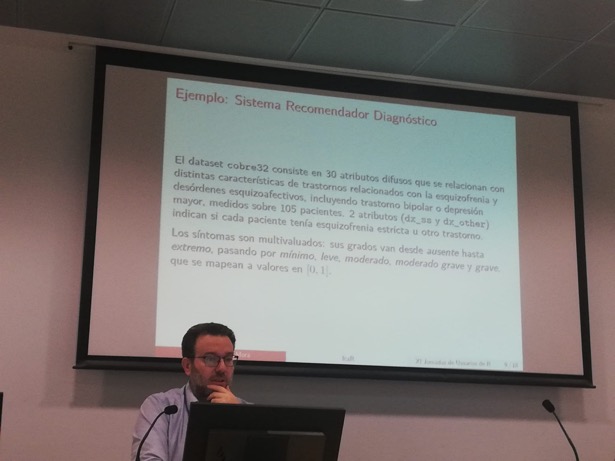
As an application, the package was used to build a recommender system in hardly 3 lines of code, to help in the differential diagnosis of schizophrenia with respect to other schizoaffective disorders.
In addition, this package has been designed to integrate with arules, the reference package of association rules in the R programming language, making it very usable by the R community researching and investigating on association rule mining and knowledge discovery.
HARMONIC'19
12/11/19/13:00 Filed in: Workshop participation
Herramientas Difusas Para el Razonamiento No Canónico, HARMONIC'19
We have had a nice extended week-end in Grazalema where the workshop HARMONIC'19 has been held. We had a number of interesting discussions on preliminary ideas for future work and prospects for new collaborations.
We participated with two contributions: the first one was done by Domingo López, who presented the recent R package developed for dealing with fuzzy implications "fcaR, an R package to handle fuzzy implications: design of a recommendation system for medical diagnosis"; the second contribution was a joint paper together with our colleagues Fran Valverde and Carmen Peláez from Univ. Carlos III Madrid entitled "On FXA for data analysis".
ESCIM'19
09/10/19/13:33 Filed in: Conference participation
European Symposium on Computational Intelligence and Mathematics (ESCIM). Toledo, Spain, October 2-5, 2019
Just back from a very intense ESCIM'19, a small symposium with a nice working atmosphere.This year it has been held in Toledo, in the old premises of St Pedro Martir and Santa María convents, nowadays in use for the University Castilla-La Mancha.
The first keynote speaker was José Luis (Curro) Verdegay.
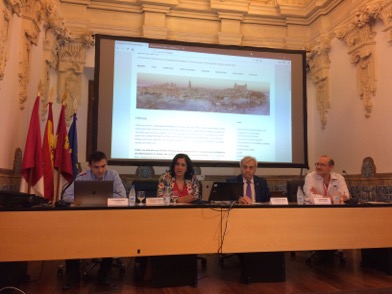
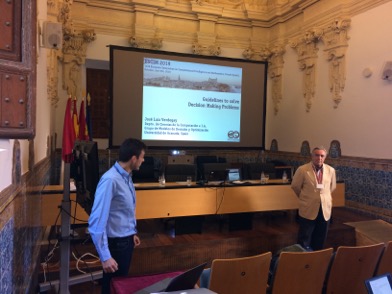
Our research team participated with three communications.
Nicolás Madrid presented Some relationships between the notions of f-inclusion and f-contradiction, in which we analyse the relationships between the notions of f-inclusion and f-weak-contradiction, and we present some theoretical results that relate both notions by means of negation operators (used to define complements of fuzzy sets) and Galois connections

Ondrej Krídlo presented On some categories underlying knowledge graphs, in which we propose a method to provide a categorical structure for RDF-based data representing descriptions of entities as a first step towards eventually providing an internal logic which enables to focus on analysis of properties of entities.
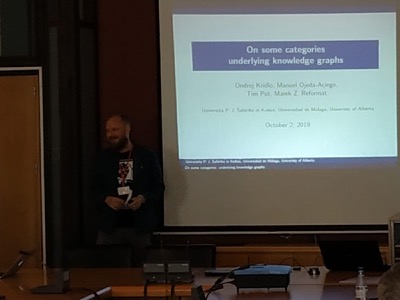
Finally, Ángel Mora presented Interactive search by means of the minimal generators, where, we provide a novel lazy algorithm with polynomial delay in which minimal generators are used as forks in a map to guide an interactive search.

EUSFLAT'19
13/09/19/11:28 Filed in: Conference participation
European Conference on Fuzzy Logic and Technology. Prague, September 9-13, 2019
We have attended the conference for presenting two papers, and participating in the Board Meeting of the journal Fuzzy Sets and Systems and the EUSFLAT General Assembly.

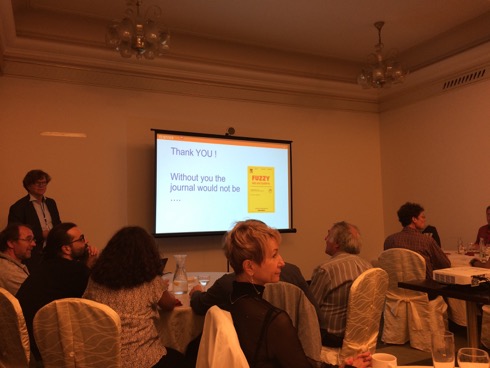
As usual, a good conference, very well-attended, with a friendly atmosphere which invites to meet a number of colleagues who work in our and related research topics.
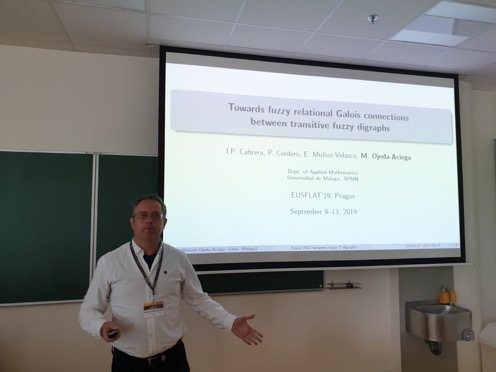

In the picture above, the heads of Lluis Godo, Francesc Esteva and Irina Perfilieva attending our talks in the first seats.
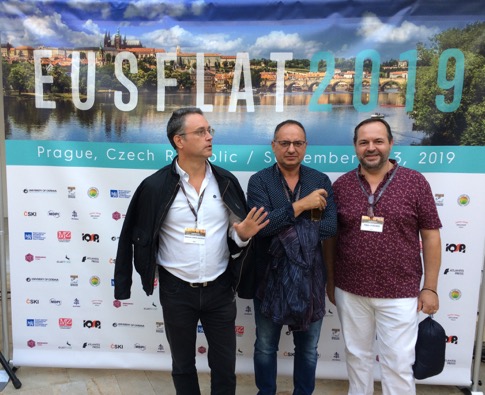
CMMSE'19
06/07/19/09:19 Filed in: Conference participation | Chairing
Intl Conf on Computational and Mathematical methods in Science and Engineering. Rota, July 1-5, 2019
Three members of the group attended CMMSE this year, where we organised a special session on "Mathematical Models for Computer Science".

Domingo López (left) presented Recommendations in CDSS using Fuzzy Formal Concept Analysis, and Nicolás Madrid (right) presented Towards a measure of inclusion from the index of inclusion between fuzzy sets.
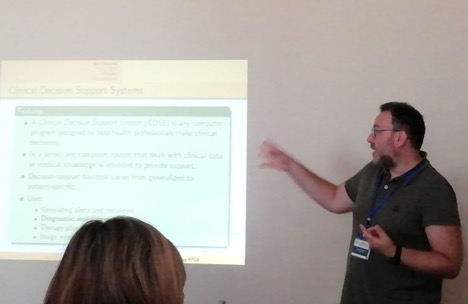
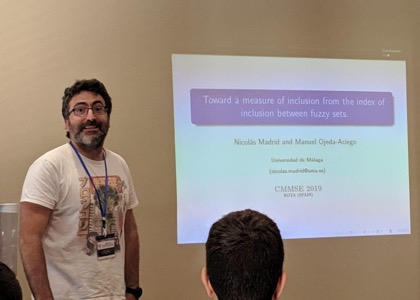
Last but not least, J.M. Rodríguez (left) presented Analysing patterns in false documents with Formal Concept Analysis to detect forgers, and Manuel Ojeda (right) presented Relational Galois connections between fuzzy t-digraphs.
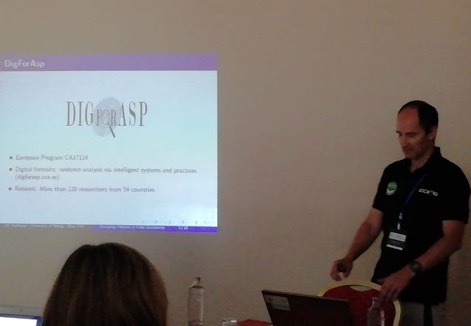
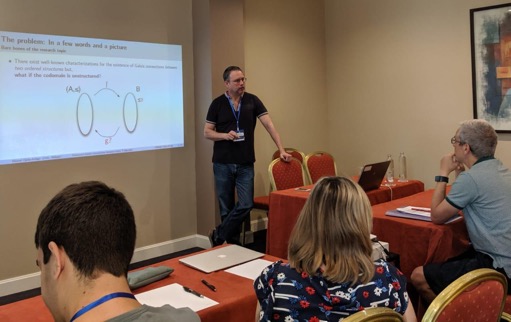
Conference papers accepted
09/07/19/09:10 Filed in: Conference papers
European Symposium on Computational Intelligence and Mathematics (ESCIM), Toledo, 2019.
- N. Madrid and M. Ojeda-Aciego. Some relationships between the notions of f-inclusion and f-contradiction.
ABSTRACT In this paper we analyse the relationships between the notions of f-inclusion and f-weak-contradiction. In particular, we present some theoretical results that relate both notions by means of negation operators (used to define complements of fuzzy sets) and Galois connections - O. Krídlo, M. Ojeda-Aciego, T. Put, and M. Reformat. On some categories underlying knowledge graphs.
ABSTRACT This paper proposes a method to provide a categorical structure for RDF-based data representing descriptions of entities. This is the first step towards our aim to further develop the underlying categorical structure so that we can eventually provide an internal logic which enables us to focus on analysis of properties of entities. - P. Cordero, M. Enciso, A. Mora, M. Ojeda-Aciego, and C. Rossi. Interactive search by means of the minimal generators.
ABSTRACT If-then rules are frequently used as basic elements for knowledge representation in several areas. In Formal Concept Analysis, these rules are the so-called implications and can be used to find minimal generators in a symbolic way by using logic. The computation of all minimal generators is exponential. Here, we provide a novel lazy algorithm with polynomial delay in which minimal generators are used as forks in a map to guide an interactive search..
Conference papers accepted
15/05/19/09:03 Filed in: Conference papers
J.M. Rodriguez-Jimenez and M. Ojeda-Aciego. Analysing patterns in false documents with Formal Concept Analysis to detect forgers. Intl Conference Computational and Mathematical Methods in Science and Engineering (CMMSE), Rota, 2019.
ABSTRACT Europe's system of open frontiers, commonly known as "Schengen", let people from different countries travel without problems crossing these frontiers. Different documents from these countries, not only European, could be found in road checkpoints, and Police forces have the problem that do not have an international database to know whether they are false or not. Some immigrants with legal problems in their original countries who need a new identity, or want a driver license to access to specific jobs, contact forgers who provide false documents with different levels of authenticity. Countries and Police Forces should improve their methodologies, by ensuring that staff is increasingly better able to detect false of falsified documents through their examination, and follow patterns to detect and ubícate these forgers. In this paper, we propose a method based on Formal Concept Analysis with negative attributes that allows Police forces analysing false documents, and provides a guide to enforce the detection of forgers.
I.P. Cabrera, P. Cordero, E. Muñoz-Velasco and M. Ojeda-Aciego. Relational Galois connections between fuzzy t-digraphs. Intl Conference Computational and Mathematical Methods in Science and Engineering (CMMSE), Rota, 2019.
ABSTRACT The notion of relational Galois connection is extended to be applied between fuzzy transitive directed graphs. In this framework, the components of the connection are crisp relations satisfying certain reasonable properties given in terms of the so-called full powering.
N. Madrid and M. Ojeda-Aciego. Towards a measure of inclusion from the index of inclusion between fuzzy sets. Intl Conference Computational and Mathematical Methods in Science and Engineering (CMMSE), Rota, 2019.
ABSTRACT Despite of the notion of inclusion between fuzzy sets has taken a great interest of a large number of researchers since Zadeh presented his seminal work in 1965, there is not a consensus about how to extend such a notion in fuzzy set theory yet. In this contribution we recall a recent fresh approach that represent the inclusion between two fuzzy sets by mean of a mapping (called index of inclusion) instead of a degree, as the standard approaches do. Moreover, we present a measure of inclusion (i.e. a degree) defined from our index of inclusion that allows to compare our approach directly with others in the literature.
D. López, A. Mora. Recommendations in CDSS using Fuzzy Formal Concept Analysis. Intl Conference Computational and Mathematical Methods in Science and Engineering (CMMSE), Rota, 2019.
ABSTRACT One of the hot topics in clinical research is hidden knowledge discovery in datasets with a high number of features (variables or attributes). We approach how to provide recommendations in Clinical Decision Support Systems (CDSS) to guide the experts in the diagnostic process. We work by mining graded implications from the dataset using the NEXTCLOSURE algorithm for Graded Attributes. Reasoning with these graded implications is done with the so-called Fuzzy Attribute Simplification Logic. As the number of graded implications mined from the fuzzy formal context is huge and with a high degree of redundancy, the objective is to obtain a equivalent set without redundancy, by applying the rules of the logic..
ABSTRACT Europe's system of open frontiers, commonly known as "Schengen", let people from different countries travel without problems crossing these frontiers. Different documents from these countries, not only European, could be found in road checkpoints, and Police forces have the problem that do not have an international database to know whether they are false or not. Some immigrants with legal problems in their original countries who need a new identity, or want a driver license to access to specific jobs, contact forgers who provide false documents with different levels of authenticity. Countries and Police Forces should improve their methodologies, by ensuring that staff is increasingly better able to detect false of falsified documents through their examination, and follow patterns to detect and ubícate these forgers. In this paper, we propose a method based on Formal Concept Analysis with negative attributes that allows Police forces analysing false documents, and provides a guide to enforce the detection of forgers.
I.P. Cabrera, P. Cordero, E. Muñoz-Velasco and M. Ojeda-Aciego. Relational Galois connections between fuzzy t-digraphs. Intl Conference Computational and Mathematical Methods in Science and Engineering (CMMSE), Rota, 2019.
ABSTRACT The notion of relational Galois connection is extended to be applied between fuzzy transitive directed graphs. In this framework, the components of the connection are crisp relations satisfying certain reasonable properties given in terms of the so-called full powering.
N. Madrid and M. Ojeda-Aciego. Towards a measure of inclusion from the index of inclusion between fuzzy sets. Intl Conference Computational and Mathematical Methods in Science and Engineering (CMMSE), Rota, 2019.
ABSTRACT Despite of the notion of inclusion between fuzzy sets has taken a great interest of a large number of researchers since Zadeh presented his seminal work in 1965, there is not a consensus about how to extend such a notion in fuzzy set theory yet. In this contribution we recall a recent fresh approach that represent the inclusion between two fuzzy sets by mean of a mapping (called index of inclusion) instead of a degree, as the standard approaches do. Moreover, we present a measure of inclusion (i.e. a degree) defined from our index of inclusion that allows to compare our approach directly with others in the literature.
D. López, A. Mora. Recommendations in CDSS using Fuzzy Formal Concept Analysis. Intl Conference Computational and Mathematical Methods in Science and Engineering (CMMSE), Rota, 2019.
ABSTRACT One of the hot topics in clinical research is hidden knowledge discovery in datasets with a high number of features (variables or attributes). We approach how to provide recommendations in Clinical Decision Support Systems (CDSS) to guide the experts in the diagnostic process. We work by mining graded implications from the dataset using the NEXTCLOSURE algorithm for Graded Attributes. Reasoning with these graded implications is done with the so-called Fuzzy Attribute Simplification Logic. As the number of graded implications mined from the fuzzy formal context is huge and with a high degree of redundancy, the objective is to obtain a equivalent set without redundancy, by applying the rules of the logic..
